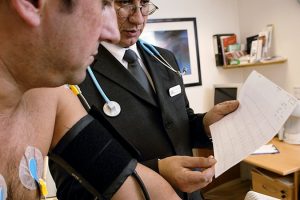Even Vigorous Exercise Appears Safe for HCM Patients: LIVE-HCM

People with hypertrophic cardiomyopathy (HCM), whether or not they are competitive athletes, needn’t be routinely advised against vigorous exercise or upping the intensity of their daily activity, suggests a prospective study of patients with clinically evident or a genetic predisposition to HCM.
Patients with HCM have traditionally been advised against activities that require intense exercise, including recreational or competitive sports, so as not to worsen their already elevated risk of ventricular arrhythmias or sudden death.
But such cautions, applied to everyone with HCM, are probably unfounded and may unnecessarily deprive such patients of the health benefits of exercise and its other rewards, say researchers reporting results from the LIVE-HCM study.
Risk for the study’s clinical primary endpoint over 3 years was similar for those of the 1660 patients who self-reported engaging in vigorous exercise, as defined on a questionnaire, and those who exercised “non-vigorously,” that is, at low to moderate levels. It was also similar for those in the vigorous-exercise group who engaged or did not engage in high-intensity competitive sports.
The composite endpoint, which consisted of death, cardiac arrest, syncope considered likely to be arrhythmic, or appropriate implantable-defibrillator shocks, occurred in fewer than 5% of study patients overall, reported Rachel Lampert, MD, on March 6 at the American College of Cardiology (ACC) Scientific Session/World Congress of Cardiology (WCC) 2023, held live and virtually from New Orleans, Louisiana.
The findings “do not support universal restriction of vigorous exercise in patients with hypertrophic cardiomyopathy.” Rather, they should inform discussion between patients and their physicians regarding safe levels of exercise “in the context of expert assessment and management of HCM using an individualized shared decision-making framework,” said Lampert, director of sports cardiology at Yale School of Medicine, New Haven, Connecticut.
Among the caveats about the trial, she said, were that the patients weren’t a randomly selected sample and received care at experienced HCM centers.
Lampert told theheart.org | Medscape Cardiology that participants were asked at the outset what their physicians had recommended to them about exercise.
About 75% of the patients with overt, clinical HCM, she said, and even a third of the phenotype-negative, genotype-positive participants had been advised not to exercise.
But given these results, “We’re now able now to say to HCM patients — after they have been appropriately evaluated by and talked with HCM experts, so that we know they’ve been assessed and treated appropriately — that you can join that soccer league, you can get all the enjoyment and physical benefits of exercise, because it’s not going to put you at higher risk than you already are.”
Exercise restriction can be an enormous burden for patients with HCM, she added. “We know that restriction from exercise worsens your quality of life. And so, I think that this,” the study’s findings, “will be liberating for that group.”
That vigorous exercise did not appear to raise the patients’ risk for major cardiac events was “really encouraging,” agreed sports cardiologist Eugene H. Chung, MD, MPH, University of Michigan Health, Ann Arbor, who isn’t associated with LIVE-HCM.
For such patients and for any level of exercise, “it’s not as high-risk as we used to think. Therefore, the message is that we should be less restrictive than we have been,” he told theheart.org | Medscape Cardiology.
In the previously published RESET-HCM trial, he noted, HCM patients who engaged in a 4-month moderately intensive exercise training program showed improved cardiovascular fitness with no increase in arrhythmic risk.
“There were essentially no real events over the follow-up period, a moderate level of activity seemed reasonable,” Chung said. Now, LIVE-HCM seems to say that “higher-intensity levels are very reasonable too.”
LIVE-HCM enrolled 1660 patients aged 8 to 60 years who had clinical HCM or a genetic predisposition but not the disease at 42 centers in North America, the United Kingdom, Australia, and New Zealand; 42% were female. Any with exercise-restricting clinical disease, such as advanced heart failure, were excluded.
Participants self-reported their level of regular exercise as vigorous (at least one activity of >6 METS for more than 60 h/y) or moderate (activities between 4 and 6 METS for more than 60 h/y) or low (not meeting criteria for vigorous or moderate exercise), per definitions in the Minnesota Leisure Time Activity Questionnaire.
About 42% and 43% of participants reported vigorous or moderate exercise, respectively; the remainder reported low exercise levels. The primary analysis compared the vigorous-exercise group to those reporting non-vigorous exercise, that is, the moderate- and low-level exercise groups combined. All events were blindly adjudicated.
The primary endpoint rate was 15.3 per 1000 person-years for the 961 patients reporting non-vigorous exercise and 15.9 per 1000 person-years for those reporting vigorous exercise. Their rates for components of the primary endpoint were also similar. Of note, about equal proportions of patients had implantable defibrillators, and all endpoint events occurred in those with clinical HCM.
Of the 699 patients reporting vigorous exercise, 259 said it was in the context of competitive sports: 440 reported vigorous noncompetitive exercise. Their primary endpoint rates per 1000 person-years were similar at 13.1 and 17.6, respectively.
The appropriate doctor-patient discussion regarding HCM and exercise may be evolving to become less about avoiding higher-intensity activity and more about the benefits of exercise, Chung observed. The message, he said, “will be that everyone needs to exercise, and that at whatever level you want to do it, it’s relatively low risk. I think we’re heading in that direction.”
LIVE-HCM was funded by the National Institutes of Health. Lampert has received consultant fees or honoraria from Abbott and Medtronic and has conducted research or has received research grants from Abbott, Amgen, and Medtronic. Chung has disclosed no relevant financial relationships.
American College of Cardiology Scientific Session/World Congress of Cardiology 2023. Session 410 – Late-Breaking Clinical Trials V: 410-08. Presented March 6, 2023.
Follow Steve Stiles on Twitter: @SteveStiles2. For more from theheart.org | Medscape Cardiology, follow us on Twitter and Facebook.
Source: Read Full Article




